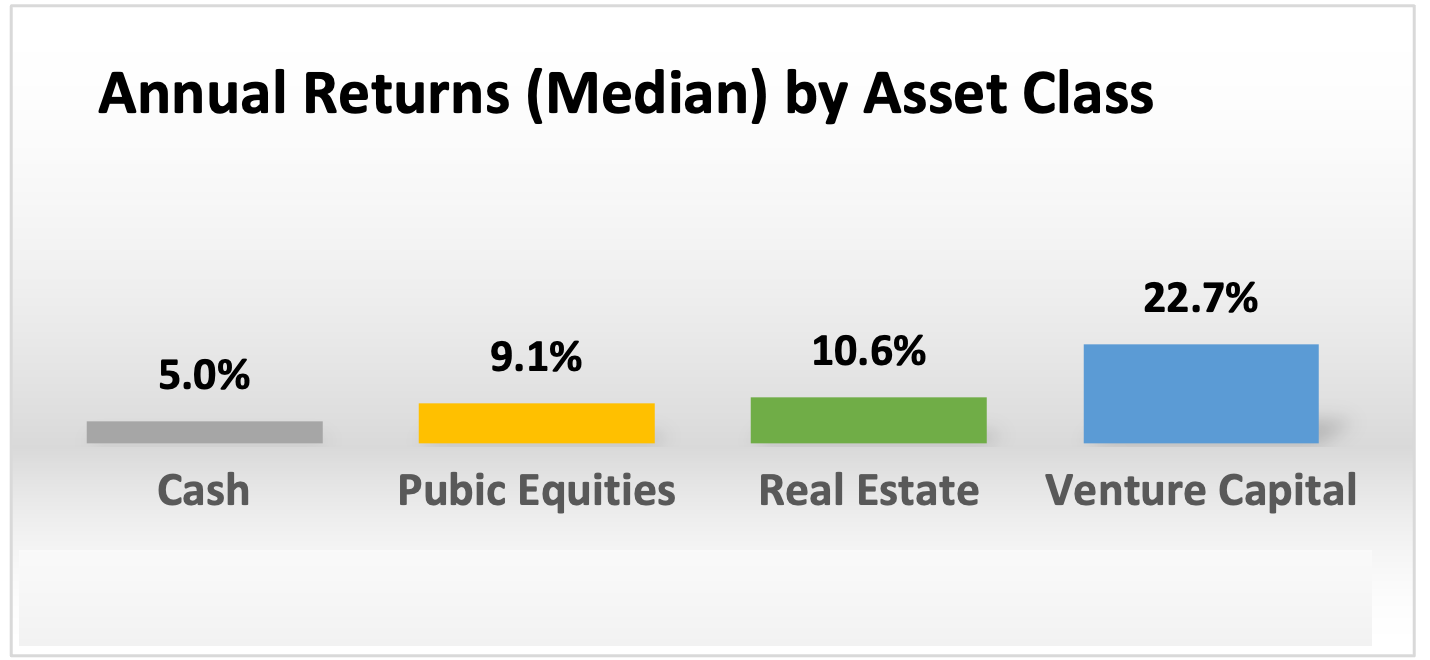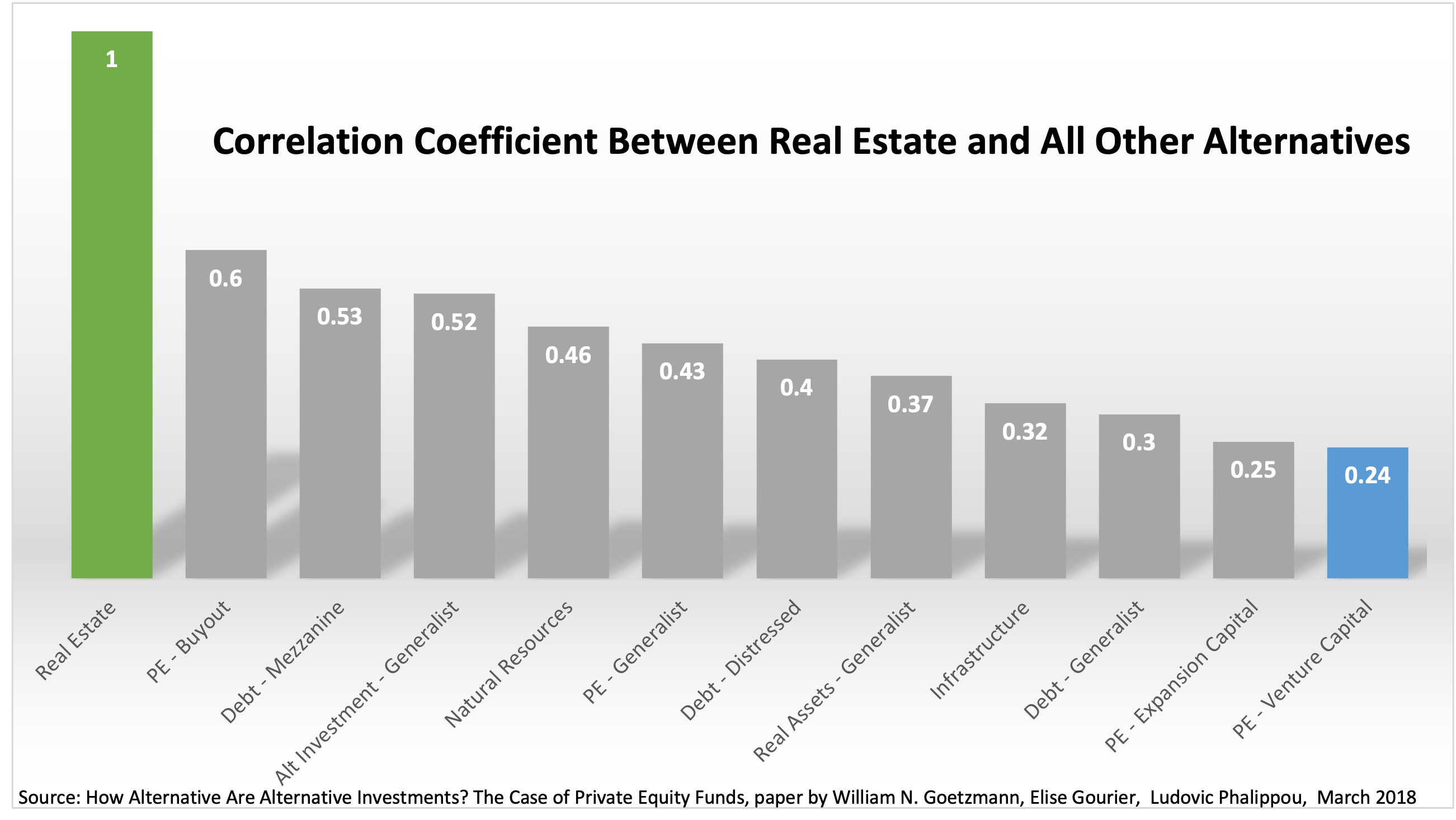Financial Portfolio Optimization
Written By: Orbit Fund Investor, Hemant Elhence
Dallas, TX , November 14, 2023 – After my recent "exit" from my software company Synerzip (co-founded in 2004), I have been noodling on the topic of how to optimize my investment portfolio, balancing the key considerations: Return, Risk (volatility of each asset type, diversifying across asset types), and Liquidity. I'm applying my finance education from The University of Chicago Booth School of Business while continuing to learn.

Figure 1 Source: Own research, Cambridge Associates
Here are my core guiding principles for my specific situation:
- Make optimal and rational portfolio decisions based on available data. Optimize at the portfolio level, accounting for the need for diversification. Use the available data on asset class performance correlation to guide decisions.
- I don't intend to make this portfolio management my full-time job. I prefer more of an auto-pilot mode of investment. I still like software/tech company operating roles as my day job.
- Keep the portfolio composition as simple as possible, while achieving a good enough balance on Return, Risk (volatility of each asset type, diversify across asset types), and Liquidity concerns.
Here is my working conclusion, subject to evolution as I learn more. After you have a significant position in public equities, adding the real-estate asset class makes a lot of sense. But what happens after that? It turns out that adding a small dose of of venture capital investment creates a great combination. Real-estate plus venture capital combination is like chocolate and peanut butter. Their opposing flavors complement one another.
Here is my rationale for my portfolio composition:
- Cash and cash equivalents: 5% of the portfolio, expected return 5% per year. Offers the lowest risk. Suitable for short-term (2 year horizon) cash needs - planned or unplanned. The recent money market rates are close to 5% per year, of course that may change in the near future.
- Public Equities (like S&P 500): 40% of the portfolio, expected return 9% per year (See Figure 1 above). Highly liquid, keeping day-to-day volatility in mind. No new insight here, just plain and simple index funds/ETFs and following the on-going discipline of periodic investment achieving dollar cost averaging. Long-term data shows median returns of 9.1% per year in the global public equities.
- Real-Estate: 45% of portfolio, expected return 15% per year (See Figure 1 below). This falls under the "Alternative Investment" asset class. I primarily focus on residential real-estate via a well managed/run firm. They do all the legwork of identifying properties, managing them, and, at the appropriate time, exiting, and rolling over the proceeds to new investments. This asset class produces an ongoing (rental) income stream, thereby reducing investment risk. This asset class is also tax efficient - it doesn't eliminate but defers tax liabilities on capital gains using IRS 1031 exchange rules. It is much less liquid than public equities. I accept being stuck for 3-5 years in each investment. Long-term data shows median annual returns of 10.6%, across all global real-estate. It seems my US-only, multifamily real-estate does much better - more like 15% per year.
- Venture Capital: 10% of portfolio, expected return of 22% per year (See Figure 1 below) . This also falls under the "Alternative Investment" asset class. Credible data shows that, of all other Alternative Investment classes, Venture Capital asset class performance has the lowest correlation with the Real Estate asset class (See Figure 2 below). This important insight promises the much needed diversification value in my portfolio. I primarily focus on early stage and growth stage tech venture capital funds. The fund managers do the legwork of identifying companies, conducting due-diligence, providing operating support, and eventual exits. I like this fund structure model, rather than making individual (aka angel investments) company investments, to reduce my burden (of deal identification, due-diligence, etc) and to so ensure I achieve the "portfolio-effect". The venture capital asset class is far less liquid than any other asset class. I accept being stuck for 5-10 years in each venture fund. Long-term data shows median annual returns of 22.7%, across all global venture capital.
So, net/net, for financial portfolio optimization I think of (Real Estate + Venture Capital) :: (Chocolate + Peanut Butter).

Figure 2

Pictured: Orbit Fund Investor Hemant Elhence with General Partners (From Left to Right: Krishna Kunapuli, Hemant Elhence, Pallab Chatterjee and Kamalesh Dwivedi)
About 3Lines:
3Lines Venture Capital (https://3lines.vc) is a venture capital firm based out of Denver, Colorado, investing in AI-enabled and disruptive software technology based startup companies in the Future of Work, Worker and the Workplace.
Hoping to meet us? Contact us! or Email to IR@3Lines.VC
November 19, 2023